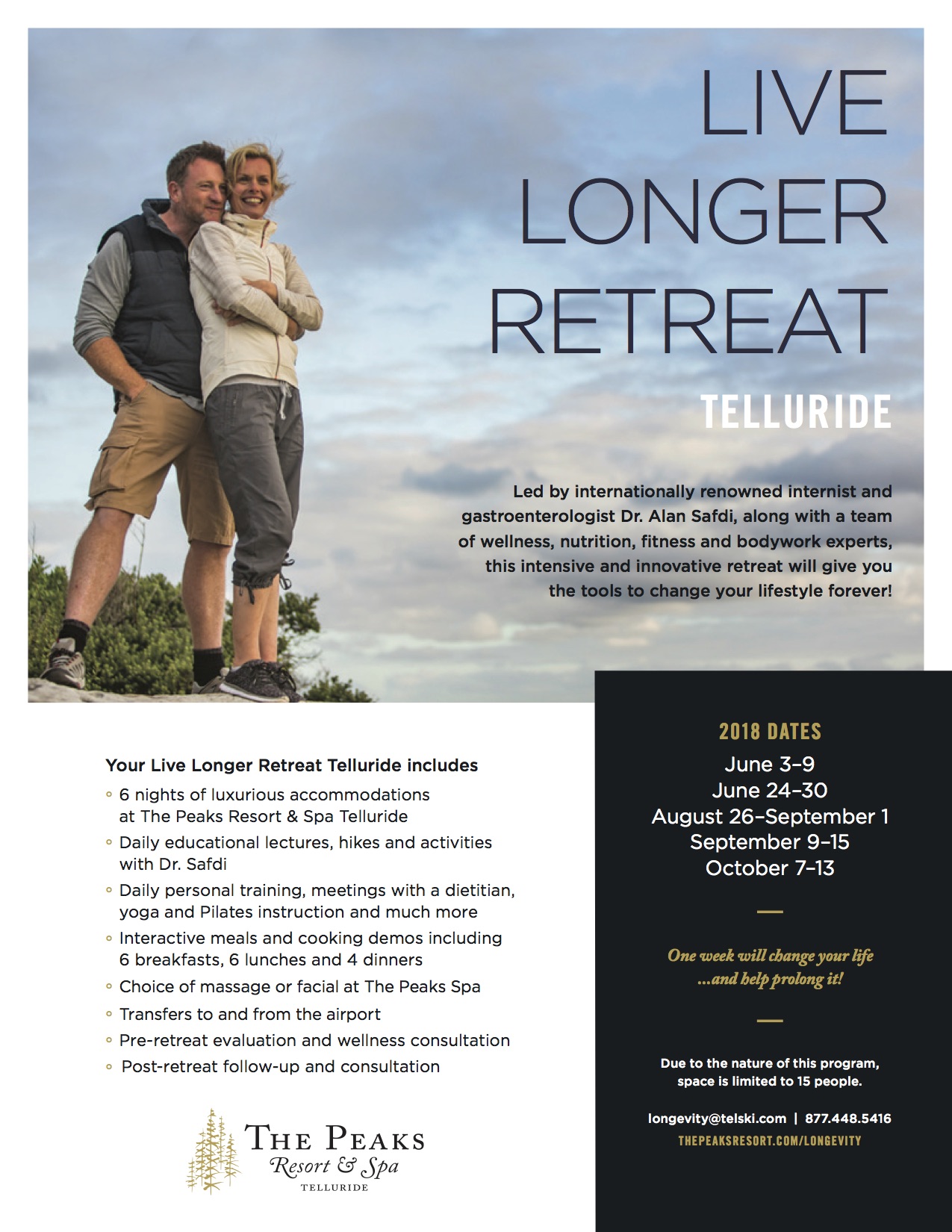
03 Jan Telski’s Live Longer Retreat – or How to Get Really Healthy and Live Longer
This summer in the Telluride region, the Telluride Ski Resort and The Peaks Resort & Spa is hosting a series of week-long wellness retreats – Live Longer Retreat – to support your (recurring) New Year’s resolution to get healthy and live longer well. The program is led by Dr. Alan Safdi, a world-renowned internist and gastroenterologist with encyclopedic knowledge of mind-body wellness and preventative medicine. He also has a gift for delivering evidence-based medical findings for healthier living in easily digestible sound bytes.
Safdi, who walks his talk, will be supported in his efforts to help you help yourself by a team of personal trainers, yoga and Pilates instructors, dietitians and nutritionists. Each retreat – June 3-9; June 24-30; August 25-September 1; October 7 – 13 – is limited to just 15 participants.
Cost for these life-altering, life-enhancing intensives is $3,000 for Telluride residents; $4500 (with accommodations) for guests. Sign up now at www.longevity@telski.com or call 1-877-448-5416 for further information.
In the run-up to the retreats (and earlier lectures in March and April), Dr. Safdi will be posting regular updates on Telluride Inside… and Out based on the latest, closely vetted research in health, wellness and longevity. The first in the series, “To Your Health,” is designed to start your New Year off right and jumpstart your Live Longer Retreat session.
Scroll down for further details about the Retreat, plus more about health and longevity in general.
Dr. Safdi also offers “Food Habits for Life” below.
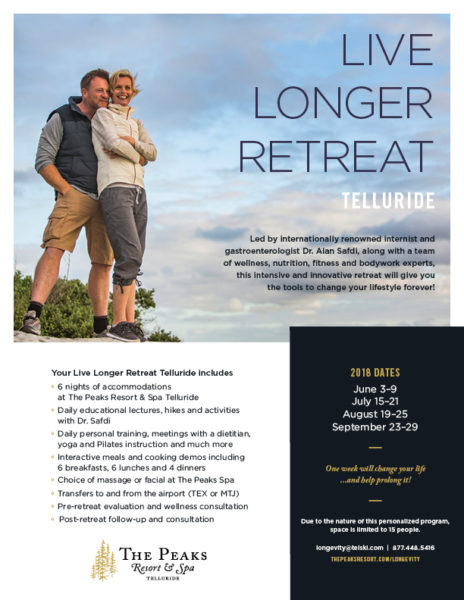
Setting the table for Live Longer Retreats: Exercise, Diet & Overall Health
You could take a pill.
The most promising, GW50516, was developed by biologist Ron Evans at the Salk Institute. Evidently “516” triggers biochemical changes that take place when people train for a marathon, changes associated with substantial health benefits.
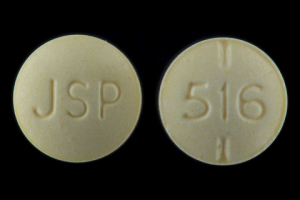
At Harvard, cell biologists have discovered two potent exercise hormones that turn metabolically inert white fat into mitochondria-packed, energy-burning brown fat – while also boosting levels of healthy proteins in the area of the brain associated with learning and memory.
That’s the good news – especially for couch potatoes.
The bad?
All experiments to date on exercise in pill form are based on mice. And, while the results are promising, the truth remains that the underlying biological processes unleashed by physical activity remain a relative mystery. In other words, scientists are still at a loss as to how exactly exercise does what it does for the mind and body.
And what exactly does exercise or movement in general do for us?
Weekly headlines seem to validate the link between exercise and stronger bones, a reduced risk of dementia, reduced risks of heart disease and stroke, even better sex.
And the evidence keeps rolling in validating the link between exercise and better mental capacity.
For example, the University of California, Los Angeles, and other credible institutions analyzed data produced by the Cardiovascular Health Study, which began in 1989 on about 6,000 men and women.
Scans showed that the top quartile of active individuals – keyword active – had substantially more gray matter compared with their peers and that the added material in the squash was located in the part of the brain associated with memory and higher level thinking. More gray matter, more neurons. That means more connections are being made, which is generally equated with greater overall brain health. What’s more, these initial findings show that people who had more gray matter correlated with physical activity also had 50 less risk of later experiencing memory decline.
For the purposes of brain health alone it looks like “move it or lose it.” And by “move it,” that particular study suggested a wide range of physical activities from walking to gardening, even ballroom dancing.
Another theory which requires further investigation suggests that expending calories in any form remodels the brain by reducing inflammation and/or the incidence of vascular disease.
So does physical activity change the arc of aging?
Dr. John Medina, a developmental molecular biologist and author of “Brain Rules,” provides a rationale for why exercise is so important for mental function at any age. In an article published last year in “Cooking Light,” Medina suggested the link makes sense from an evolutionary standpoint because the constant activity as our ancestors hunted and gathered was key to our species’ brain development.
And still is.
It may have something to do with a protein called BDNF or Brain-Derived Neurotropic Factor, which helps new brain cells form while keeping existing neurons younger. Medina described the protein as “close to a magic bullet as you can get.”
But wait…There is more.
Think your birthday necessarily dictate how you look, act, and feel? Does your birthday tell the whole story about your physical health – or is there such as thing as a “fitness age”? Are conditions like arthritis, back pain, loss of range of motion and flexibility inevitable? How about anxiety and depression associated with the aforementioned conditions? And cancer?
Bet you know the answer by now: no siree bob.
In fact, a study of 4000 senior Olympians with an average age of 68 showed a fitness age of 43.
“Although we were guessing we might see 15 years’ difference, we never would have through they’d shave a quarter of a century off their real age,” said Pamela Peeke, MD, MPH, also assistant clinical professor medicine, University of Maryland.
Lots of factors come into play when calculating your fitness age: weight; frequency and intensity of your exercise program; resting and maximum heart rates; and waistline measurement, but here’s an uplifting factoid from author Chris Crowley, who wrote the bestseller “Younger Next Year” (and the 2016 sequel).
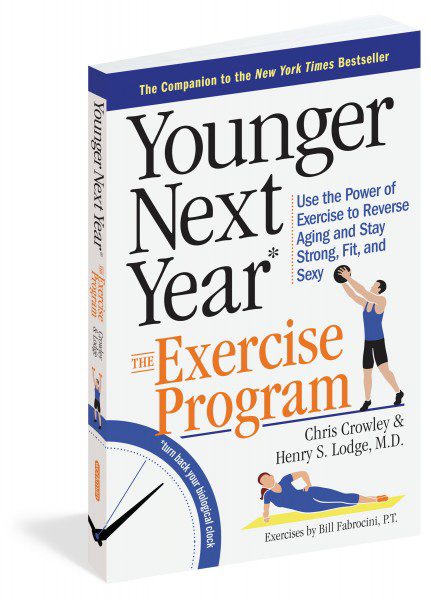
And these facts remain true even if you are not an Olympian:
“If you make the behavioral changes he talks about, you can put off 70% of aging until the end of life. You can eliminate 50% of the serious illness and accidents all the others are going to have forever. Those are astonishing claims,” Crowley says, “and absolutely true. In fact, they are conservative.”
In other words, it appears we have a choice: exercise and stay in our groove or remain passive and let aging happen.
Your move…
As for the impact of nutrition on your health, we hold certain truths to be self-evident. Barely a week goes by without being reminded of the fact that our diet can helps us reach and maintain a healthy weight, reduce our risk of chronic diseases (like heart disease and cancer), and promote overall health.
The key question is this: How to eat healthy?
The following are guidelines offered by Dr. Safdi.
Food Habits for Life:
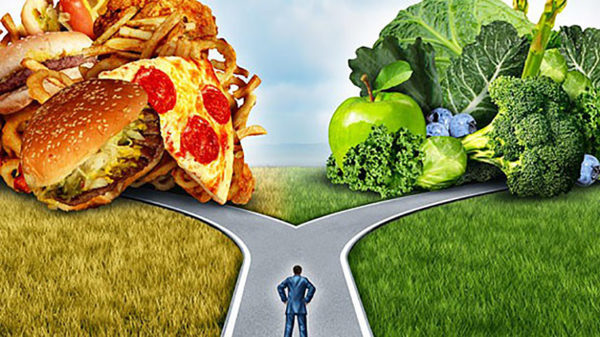
1. Choose a Mediterranean diet. Of all the diet choices out there, the Mediterranean diet is hot in the news, with data to backup claims that it can help prevent chronic diseases and increase longevity. Can you identify the main components of such a diet? (Answer at the end of the story.)
a. Plant-based (ie. Whole grains, fruits, veggies, nuts)
b. Fish and chicken at least twice per week—almost no red meat
c. Red wine in moderation only
d. All of the above.
2. Eat breakfast at home to avoid reaching for a sugar-packed “energy bar” or rolling through the fast food drive through line. Steel cut oatmeal is a perfect choice for a high-fiber, low sugar, whole grain approach. Jazz it up with nuts, chia seeds, cinnamon and blueberries (flash frozen are just as tasty and much cheaper). The extras provide an excellent source of antioxidants to help reduce your risk for both heart disease and cancer.
3. Fast food is OK! Well … but not whoppers and fries. Even faster than waiting in a drive-through line is peeling a banana; scooping a handful of pumpkin seeds; popping the lid off a container of hummus to eat with a bag of baby carrots.Go NUTs!! A 20 year-long study from Harvard found a regular diet of both nuts and yogurt independently prevented weight gain. Stock up these healthy snacks and put them in baggies for easy on the go access.
4. Pair a soup or a salad with every dinner.Salads help curb hunger as well as meet the recommended requirement of about 2 cups of fruit and 2- 2 ½ cups of veggies per day.
5. Eat s-l-o-w-l-y.Enjoy each bite. Wait a good 10 minutes before deciding to have a second plate.
6. Carry a water bottle with you everywhere. Our brain can easily be tricked into thinking it’s hungry when we’re really just thirsty.
7. Don’t buy garbage. Sorry, potato, this includes you in every shape and form per the above mentioned Harvard study. When you’ve spent 10 hours at work and now you’re home and famished, of course chips look like the perfect appetizer to a frozen pizza entrée. But if you’re like most people and do not have the willpower to just have a small serving, ditch the junk food aisle. Shopping the perimeter of the store can help you make wise food choices, as the heavily-processed, preservative-rich foods tend to be in the center of the store.
8. Consistency is key in your exercise program. Short-term goals lead to long-term results.
9. Start by sweating 20 minutes a day and always discuss all recommendations with your physician first.
10. Make it a priority to to become your strongest, healthiest and most importantly, HAPPIEST self through fitness and nutrition. Motivate yourself and stay positive!
(Mediterranean diet includes “d” all of the above.)
Cue the Live Longer Retreats.
Live Longer Retreats, a brief overview:
If you commit to a Live Longer Retreat, the promise from Dr. Alan Safdi and his hand-picked team is that in just one week, the innovative intensive will provide all the necessary tools to change your lifestyle forever and enhance and lengthen your life.
What’s on the program?
• Pre-retreat evaluation and wellness consultation
• Daily educational lectures, hikes, and activities with Dr. Safdi
• Daily personal training, meetings with a dietician, yoga and Pilates instructors and personal trainers
• Interactive meals and cooking demonstrations, including 6 breakfasts, 6 lunches and 4 dinners.
• Choice of massage or facial at The Peaks Spa.
• Post-retreat follow-up and consultation.
• And, if you are coming from out of town, 6 nights of luxurious accommodations at The Peaks Resort & Spa and transfers to and from the airport.
More about Dr. Alan Safdi:
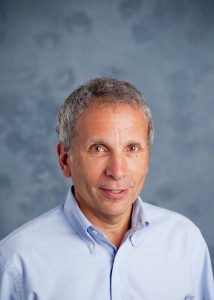
Dr. Alan Safdi
Dr. Alan Safdi is a board-certified in Internal Medicine and in Gastroenterology and a Fellow of the American College of Gastroenterology. A proven leader in the healthcare arena, Safdi has been featured on the national program “Medical Crossfire” and authored or co-authored numerous medical articles and abstracts. He has been an investigator in over 581 studies and is President of both the Consultants For Clinical Research and the Ohio Gastroenterology and Liver Institute.
Dr. Safdi has been involved in grant-based and clinical research for about 35+ years and is passionate about disease prevention and wellness, not just fixing what has gone wrong. He lectures internationally on the subjects of wellness, nutrition, and gastroenterology.
More about the other lectures:
A series of lectures given by Dr. Alan Safdi and Dr. William Renner in Telluride is planned for the Spring. The talks on health, wellness, and longevity research target health care providers as well as the general public.
A new workshops targets the veterinary world with lectures and hands-on training for veterinarians in the field of endoscopic therapy in animals. Multiple stations with direct hands-on learning with in-depth lectures with regards to GI disease that can be treated or prevented with endoscopic therapy. For more information, visit the following websites: www.wellnesstelluride.org/


Sorry, the comment form is closed at this time.